- Home
- Louis Sachar
Wayside School Beneath the Cloud of Doom Page 8
Wayside School Beneath the Cloud of Doom Read online
Page 8
A teacher stood in the doorway. “Quick. Come inside,” she beckoned. “You’ll be safe here.”
She had a long fingernail on her pinky.
28
The Teacher With the Long Fingernail
Like moths, the children went to the light.
“Welcome, welcome, glad you’re here, come in,” the woman said as they filed past and joined the other kids in her class
“I’m sorry I don’t have enough desks, but we’ll make do. Please find a place on the floor for now.”
The children did as they were told. They felt safe, even if a bit uncomfortable. They could no longer feel the school shake, or hear the kachooga boops.
“Miss Zarves,” said Mrs. Jewls. “It’s so good to see you! How long has it been?”
“Feels like forever,” said Miss Zarves.
“I never bump into you in the teachers’ lounge,” said Mrs. Jewls. “We must just keep missing each other.”
“I try not to bump into people,” said Miss Zarves.
Miss Zarves was tall and thin. Her skirt and blouse were neat and trim. Her short hair looked shiny and silky, and smelled like strawberry shampoo. Everything about her was neat and orderly, except for that one fingernail.
“And how’s Mavis?” asked Miss Zarves.
Mavis was Mrs. Jewls’s daughter.
“Adorable,” said Mrs. Jewls. “But they grow up so fast, don’t they?”
“I wouldn’t know,” said Miss Zarves.
“You don’t look like you’ve aged a day,” said Mrs. Jewls.
“Very nice of you to say,” said Miss Zarves.
Mrs. Jewls wasn’t just being nice. Miss Zarves hadn’t changed one bit—except for her fingernail, of course, which had grown considerably longer.
Calvin walked between the two teachers. “Excuse me, Miss Zarves,” he said. “I think I’m supposed to give you this.”
He handed Miss Zarves a folded piece of paper that was so old, it tore as Miss Zarves unfolded it. She strained to read the faded writing.
“Oh, okay,” she said to Mrs. Jewls, then dropped the note in the trash.
“Is that the note I gave you to give Miss Zarves?” Mrs. Jewls asked Calvin.
Calvin shrugged. “I just found it in my pocket,” he said, sounding even more surprised than Mrs. Jewls.
Mrs. Jewls stared at him. “You told me you gave it to her,” she accused.
“I don’t think I ever said that,” said Calvin.
Mrs. Jewls continued to stare as he returned to his seat on the floor.
“We were just about to have our history review,” said Miss Zarves. “Who’s your best history student?”
“Myron,” Mrs. Jewls answered, without hesitation.
Myron had gotten the highest score on the history portion of the Ultimate Test.
“Myron, stand up, please,” said Miss Zarves.
He stood.
“What kind of shoes did Mary Bopkins like to wear?” Miss Zarves asked him.
“Who?” asked Myron.
The kids from Miss Zarves’s class giggled.
“No laughing,” said Miss Zarves. “We don’t laugh at stupid people. Don’t feel bad, Myron. You may be stupid now, but once you’ve been in my class for a few years, you’ll know the history of everybody. Mark, would you please tell Myron the answer.”
“A few years?” Myron asked, but Miss Zarves ignored the question.
Mark Miller stood up. “Which Mary Bopkins do you mean?” he asked. “The one born in 1801 in Boston, or the one born in 1954 in San Francisco?”
“Boston,” said Miss Zarves.
“Red boots,” said Mark.
“Excellent,” said Miss Zarves.
“Who’s Mary Bopkins?” asked Mrs. Jewls. “Was she famous?”
“Why?” asked Miss Zarves. “Does your class only study famous people? Do you think famous people are more important than people who aren’t famous?”
“But there isn’t enough time to study everyone,” said Mrs. Jewls.
“We don’t play favorites in my class,” said Miss Zarves.
She went to the back closet and took out several giant stacks of papers. “This is everyone born in 1837.” She went around the room, handing each student a stack of a hundred pages or more. “When you finish studying a page, please pass it on to someone else.”
Myron stared helplessly at his stack. “I can’t even read this,” he complained. “I think it’s Chinese.”
“Well, yes, a lot of people were born in China,” said Miss Zarves.
She handed Myron a Chinese dictionary and said, “You’ll need this.”
It is impossible to say how long Myron sat there, fumbling through the dictionary as the kids around him were passing around their sheets of paper.
He might have been there an hour. Or a day. Or a week.
Time passes slowly when you’re trying to read a Chinese dictionary.
Even if you’re Chinese.
He glanced up and spotted a pair of scissors on Mark Miller’s desk. He got an idea.
“Hey, Mark, can I borrow those for a sec?” Myron asked.
“Sure,” said Mark.
Myron took the scissors, then walked bravely to the front of the room.
He didn’t know if his plan would work. In fact, it really didn’t make any sense, but it was his only h-o-p-e.
“Excuse me, Miss Zarves. I can trim your fingernail for you, if you like,” he offered.
“My fingernail?” asked Miss Zarves, astonished by such a suggestion. “Which one?”
“The long one on the end,” said Myron.
Miss Zarves looked at her hand. “Hmm, now that you mention it, it has gotten long. I guess I hadn’t noticed, because it grew so slowly.”
She held out her hand.
Myron pressed hard on the scissors and snipped it off.
“That does feel better,” said Miss Zarves. “Thank you, Myron.”
Myron held the fingernail up in the air.
Except, he was no longer standing in the front of the classroom. He was standing on the stairs, and everyone else from Mrs. Jewls’s class lay sprawled across the staircase.
“A million!” he shouted triumphantly.
29
After the Storm
The boops and booms had stopped, and the lights were back on.
Myron and the others had to step over all sorts of objects as they made their way back up toward their classroom. The stairs were strewn with books, papers, cafeteria trays, musical instruments, an air pump, a giant stuffed walrus, and even a bust of Sigmund Freud.
Between the twenty-sixth and twenty-seventh floors, the stairs were completely blocked off by Mr. Kidswatter’s enormous desk. They all had fun climbing over it, including Mrs. Jewls.
Once back in class, Myron dropped Miss Zarves’s fingernail into the bucket, which, unfortunately, was empty. Sadly, the other nine hundred thousand, nine hundred, and ninety-nine clippings were gone.
Myron would have written 1,000,000 on the blackboard anyway, but there was no blackboard.
The chalk was there, however.
It was as if everything inside Wayside School had been shuffled like a deck of cards and dealt out randomly to every floor.
(Mrs. Jewls’s blackboard was eventually discovered in the library. Fingernails and toenails would continue to be found for years to come, sometimes in very strange places.)
The sun shined. The sky was as blue as Allison’s eyes. Birds chirped as they flew about.
There had been no birds during the dark days of doom.
Louis, the yard teacher, shoveled snow off the roof. Among other things, the cloud had dumped huge amounts of snow. The playground sparkled white.
Louis had to be careful. The snow was packed high above the guardrails and was very slippery. “Look out, below!” he shouted as he tossed a shovelful of snow over the edge.
Down below the kids were playing a kind of reverse dodgeball. It was the boys against the girls.
Every time Louis shouted, “Look out below!” they did the opposite.
Eric Ovens charged past Jenny and dived face-first, sliding across the snow-covered ground. Louis’s clump smacked him right on the head.
“One point!” he exclaimed.
Recess was three hours today. The kids had been sent out to play, while the teachers were stuck with cleaning up the mess made by the storm.
Just as Mrs. Jewls had predicted, now that the Cloud of Doom was gone, the world had become a happier place. The only thing missing was a rainbow.
“Look out below!” Louis called from the other side of the school.
They raced around the building. Leslie dived toward the falling clump. “One point,” she declared.
“No way, Miss Piggy-tails,” said Terrence. “It missed you!”
“Did not!” Leslie insisted. “See, look at all the snow in my hair.”
“That’s ground snow,” argued Terrence.
Dana came to Leslie’s defense. “Some of it came from the ground,” she agreed. “But four flakes came from the air. I saw them.”
“How can you see four snowflakes?” asked Paul.
“Super glasses!” said Dana, pointing to her spectacles. She picked four snowflakes out of Leslie’s hair. “One, two, three, and four. Just like I told you.”
“That proves it!” declared Bebe. “One point!”
Paul scowled. He remained skeptical of her spectacles.
Up on the roof, Louis spotted something sticking out of the snow. It was purple and green, with some yellow dots.
He tried to pull it free, but it was stuck. He pulled hard.
It still wouldn’t budge.
He gave it one hard yank!
The umbrella jerked free, but Louis’s feet slipped out from under him. He fell on his bottom and slid backward across the roof.
“Look out below!” he shouted as he went over the edge.
The children ran to the call. They were quite surprised when they looked up and saw the yard teacher coming toward them.
Louis looked down. He didn’t want to hurt the children.
He considered trying a Mary Poppins, but he was holding the wrong end of the umbrella, and there wasn’t time to change his grip and try to open it.
His best chance was to grab the top of the flagpole.
Wayside School had an extra-tall flagpole so it wouldn’t look puny next to the building.
Louis reached out for it but missed.
The next thing he knew, he was spinning wildly in circles.
The curved handle of the umbrella had hooked the pole.
Louis whirled dizzily around it as he slowly moved down the pole. By the time he reached the ground, he must have circled the flagpole more than a thousand times.
Sharie ran to him.
To Louis, it looked like there were six Sharies, all spinning like tops.
“Thanks, Louis—you’re the best!” said Sharie, taking her umbrella. “But really, there was no big rush. You could have just used the stairs.”
30
Rainbow
There was no stove in the cafeteria kitchen. An enormous pot hung from a thick chain above a blazing fire.
“Lower the pot,” ordered Miss Mush.
Mr. Pepperadder turned the squeaky crank, and the pot came down.
“What will it be today?” he asked.
“Shh!” said Miss Mush.
Mr. Pepperadder knew better. You must never interrupt a great artist during her moment of inspiration.
Miss Mush’s eyes were closed. She rubbed her chin. She wanted to make something truly special after the Storm of Doom. “Rainbow stew!” she declared as she raised her wooden spoon high above her head.
“Brilliant!” agreed Mr. Pepperadder.
“What do we have that’s red?” asked Miss Mush.
Mr. Pepperadder looked over his inventory list. “Red cabbage,” he said. “Beets, strawberries, red peppers.”
Miss Mush waved the wooden spoon and said, “Toss them in the pot!”
Flames shot up as Mr. Pepperadder threw in the ingredients. He had to shield his eyes from the smoke.
“What about yellow?” asked Miss Mush.
“Yellow squash, bananas, yellow peppers, yellow onions . . .”
“Start with the bananas,” said Miss Mush, “and then we’ll see about the onions.”
Mr. Pepperadder started to peel a banana, but Miss Mush stopped him.
“The peel is the part that’s yellow,” she reminded him. “If I wanted white, I would have asked for peeled bananas.”
“Sorry,” said Mr. Pepperadder. He tossed fifty-seven bushels of bananas, peels and all, into the pot.
There was a loud hissing noise, as steam filled the room.
Some cooks considered things like taste, or perhaps nutrition, when preparing a meal. For rainbow stew, color was all that mattered.
Miss Mush stirred the pot with a large stick. “Perhaps a little black now, for definition,” she said.
Mr. Pepperadder read from his list. “Poppy seeds, burnt toast, my shoes . . .”
High above them, in Mrs. Jewls’s class, several children held their noses.
“What’s that smell?” asked Calvin.
“Miss Mush must be cooking something,” said Bebe.
“It smells like shoes,” said Myron.
D.J. sniffed. “Black shoes,” he said. “With hard soles, and no laces.”
“You can smell the laces?” asked Kathy.
“No,” said D.J. “I just told you there weren’t any laces.”
Mr. Kidswatter’s voice came over the speaker. “GOOD MORNING, STUDENTS. IT’S ANOTHER GREAT DAY HERE AT—”
There was the sound of paper rustling.
“—WAYSIDE SCHOOL. FOR LUNCH TODAY, MISS MUSH WILL BE SERVING RAINBOW STEW. IT WILL BE THE GREATEST LUNCH EVER!”
Fifteen floors beneath them, Miss Mush felt her stomach tighten. She too heard Mr. Kidswatter’s morning announcement. Now the pressure was on.
She climbed a ladder and stared down into the bubbling pot. Her face was covered with soot and sweat. “Something orange,” she decided.
“How about oranges?” suggested Mr. Pepperadder.
“Too obvious,” said Miss Mush.
“Carrots?”
“I suppose . . .” said Miss Mush, although carrots didn’t feel right to her.
Inspiration struck! “Eighteen pumpkins!” she exclaimed.
Each pumpkin made a giant splash, as Miss Mush and Mr. Pepperadder took turns tossing them into the pot.
After all the pumpkins were added to the stew, a tiny smile crept across Miss Mush’s face.
It was a smile that all great artists know well. After years of self-doubt, she started to believe that she was on the verge of creating something truly wonderful.
But it was just a quick smile, and then back to work!
The doubts always return.
The lunch bell kaboinked, and the children descended upon the cafeteria.
“Rainbow Stew,” said Benjamin. “It sounds like it could be good.”
“Don’t let the name fool you,” warned Todd. “The better the name, the worse it tastes.”
“Remember when she made ‘Midnight Madness’?” asked Paul.
“Don’t even say it!” snapped Leslie. “I was up all night, running around in circles.”
Miss Mush and Mr. Pepperadder stood shoulder to shoulder as the children lined up. They had finished the stew only moments before.
“I hope they like it,” Miss Mush whispered.
“They will,” Mr. Pepperadder assured her. He wore short pants, black socks, and no shoes.
Miss Mush hoped he was right, but all her doubts had returned. Her apron was splotched with lots of bright colors, but the rainbow stew looked like lumpy grayish-brown mud.
She didn’t understand it. What had happened to all the colors?
Maurecia reached the front of the line. Miss Mush scooped some rainbow stew into a
bowl and handed it to her.
“Thank you, Miss Mush,” said Maurecia, always polite.
“Sorry, it was supposed to be a bit more colorful,” explained Miss Mush. “I don’t know what went wrong.”
Joy was next.
“Sorry,” Miss Mush said again as she handed a bowl to Joy.
“Sorry, Ron,” she said. “Sorry, Deedee. Sorry, Joe. Sorry, John. Sorry, sorry, sorry. . . .”
Allison and Rondi sat at one end of a long table. “Are you going to eat it?” Rondi asked Allison.
“I have a tangerine in my pocket,” said Allison. “Maybe I’ll just eat that.”
Rondi watched as Allison slowly removed the entire peel in just one piece.
Deedee counted the points on her fork.
D.J. swirled his plastic fork through the gray muck. “Well, here goes,” he announced.
He poked his fork into something solid. It could have been a vegetable, or maybe a piece of meat, or perhaps part of a shoe.
He lowered his fork. “Maybe later,” he said.
“Looks delicious!” Kathy said enthusiastically. She took a big spoonful, brought it to her mouth, and swallowed.
“Yummy!” she declared.
The other kids couldn’t be sure. They could never tell anymore when Kathy was speaking in opposites.
Calvin stabbed something gooey with his fork. He brought it to his mouth, chewed a while, and then chewed some more.
“Well?” asked Bebe.
Calvin wasn’t sure how to describe it. “Red,” he said at last.
“Red?” questioned Allison. “That’s a color, not a taste.”
“And blue,” said Calvin.
Rondi took a bite. She chewed awhile. “Purple!” she declared.
“I taste yellow!” said Todd.
Dana swallowed. “Pink!” she exclaimed.
John finished chewing, then swallowed. “Kind of a blue green,” he said.
“It’s delicious,” said Sharie. “Purple and green with yellow polka dots.”
The more they chewed, the more colors they tasted.
“That’s silly,” said Allison. She took a bite.
Her eyes shone. She tasted orange, with green and purple stripes, and a black outline.
“Do you like it?” asked Rondi.
“Only the best lunch ever!” said Allison.

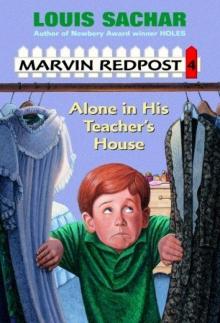 Alone in His Teacher's House
Alone in His Teacher's House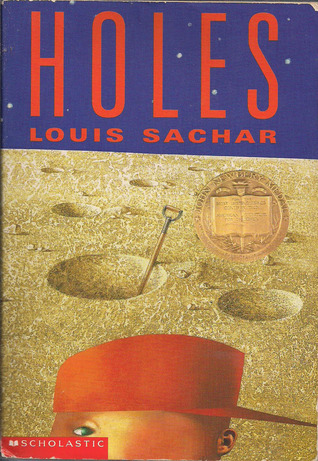 Holes
Holes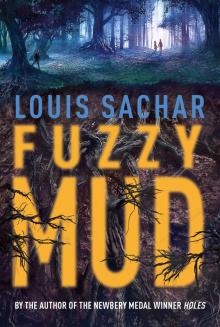 Fuzzy Mud
Fuzzy Mud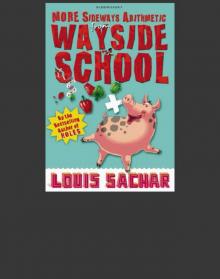 More Sideways Arithmetic From Wayside School
More Sideways Arithmetic From Wayside School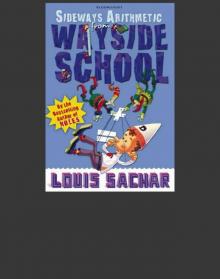 Sideways Arithmetic From Wayside School
Sideways Arithmetic From Wayside School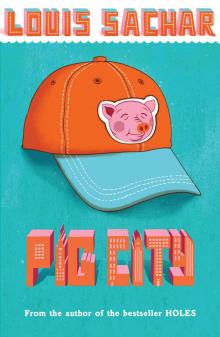 Pig City
Pig City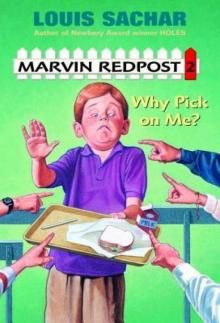 Why Pick on Me?
Why Pick on Me?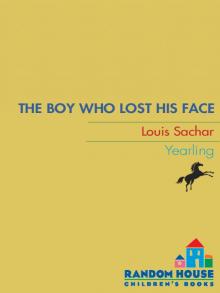 The Boy Who Lost His Face
The Boy Who Lost His Face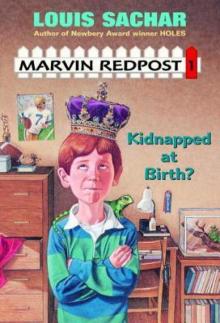 Kidnapped at Birth?
Kidnapped at Birth?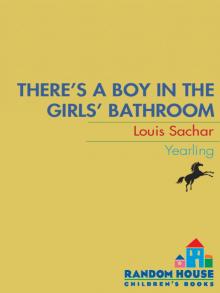 There's a Boy in the Girls' Bathroom
There's a Boy in the Girls' Bathroom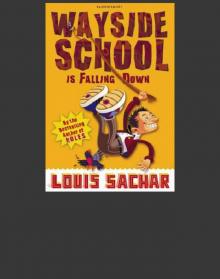 Wayside School Is Falling Down
Wayside School Is Falling Down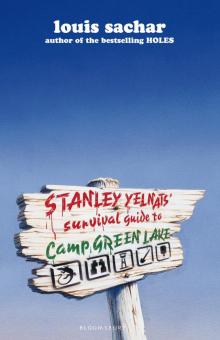 Stanley Yelnats' Survival Guide to Camp Green Lake
Stanley Yelnats' Survival Guide to Camp Green Lake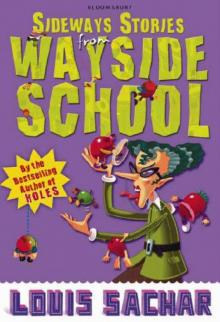 Sideways Stories from Wayside School
Sideways Stories from Wayside School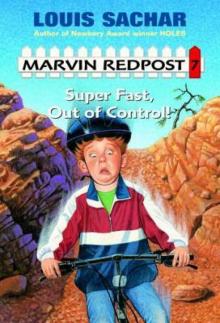 Super Fast, Out of Control!
Super Fast, Out of Control!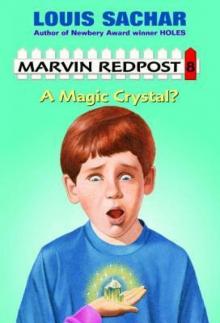 A Magic Crystal?
A Magic Crystal?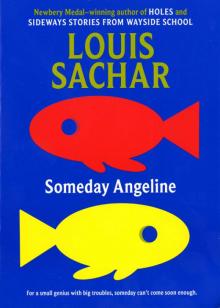 Someday Angeline
Someday Angeline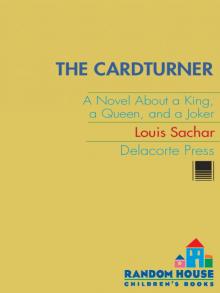 The Cardturner: A Novel About Imperfect Partners and Infinite Possibilities
The Cardturner: A Novel About Imperfect Partners and Infinite Possibilities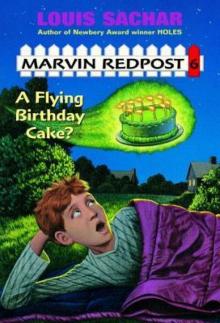 A Flying Birthday Cake?
A Flying Birthday Cake?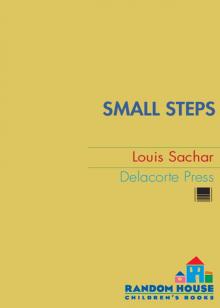 Small Steps
Small Steps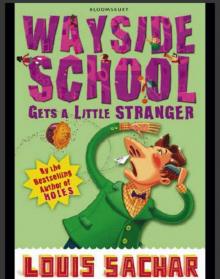 Wayside School Gets a Little Stranger
Wayside School Gets a Little Stranger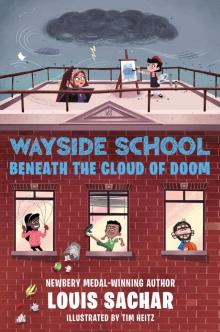 Wayside School Beneath the Cloud of Doom
Wayside School Beneath the Cloud of Doom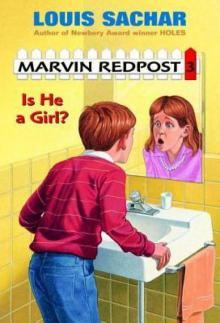 Is He a Girl?
Is He a Girl?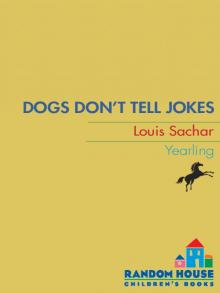 Dogs Don't Tell Jokes
Dogs Don't Tell Jokes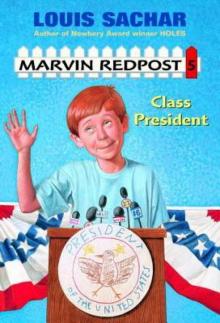 Class President
Class President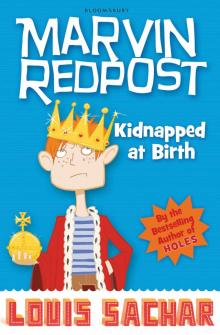 Kidnapped at Birth
Kidnapped at Birth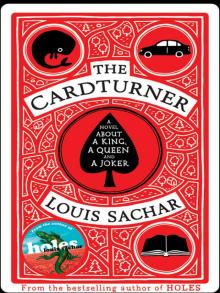 The Cardturner
The Cardturner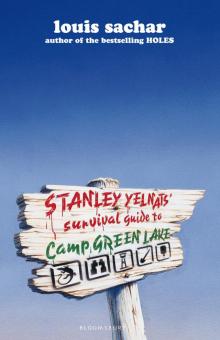 Stanley Yelnats' Survival Guide to Camp Greenlake
Stanley Yelnats' Survival Guide to Camp Greenlake